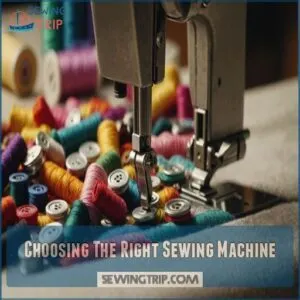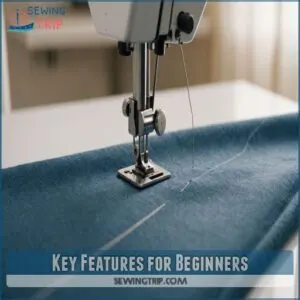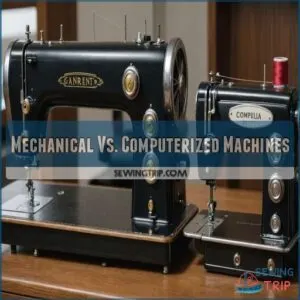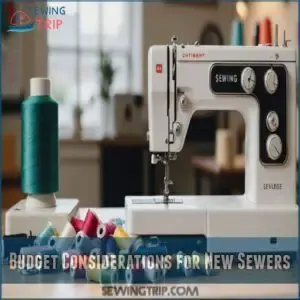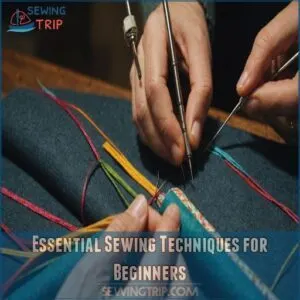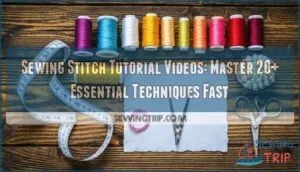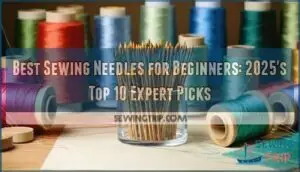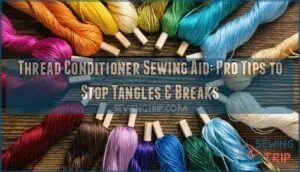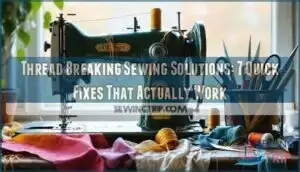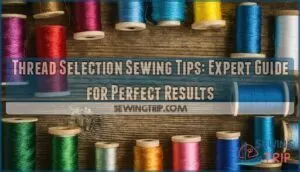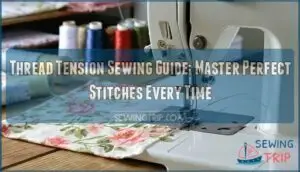This site is supported by our readers. We may earn a commission, at no cost to you, if you purchase through links.
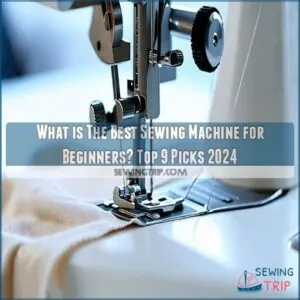 Choosing the best sewing machine for beginners isn’t a needle in a haystack!
Choosing the best sewing machine for beginners isn’t a needle in a haystack!
Start with the Brother XM2701, perfect for those new to sewing.
It’s affordable, with 27 built-in stitches, an automatic needle threader, and a jam-resistant bobbin, making your sewing journey smooth as silk.
If you’re a tech enthusiast, try the Janome C30, a computerized option that does half the thinking for you!
Look for features like a buttonhole maker and free arm for easy hemming.
Remember, the right machine should fit your needs, not break the bank.
Curious about what else these machines offer? Stick around!
Table Of Contents
- Key Takeaways
- Choosing The Right Sewing Machine
- Key Features for Beginners
- Top 9 Sewing Machines for Beginners
- 1. Bernette 35 Swiss Design Sewing Machine
- 2. Singer Heavy Duty Sewing Machine
- 3. Brother XR3774 Sewing Quilting Machine
- 4. Janome MOD 50 Computerized Sewing Machine
- 5. Mini Sewing Machine for Beginners
- 6. Mini Sewing Machine for Kids
- 7. Portable Sewing Machine with 12 Stitches
- 8. Juki HZL 70HW Sewing Machine
- 9. Brother XM2701 Sewing Machine
- Mechanical Vs. Computerized Machines
- Budget Considerations for New Sewers
- Essential Sewing Techniques for Beginners
- Frequently Asked Questions (FAQs)
- Conclusion
Key Takeaways
- You’ll find that the Brother XM2701 is a top pick for beginners, offering ease of use, affordability, and essential features like an automatic needle threader and jam-resistant bobbin.
- Consider whether you prefer a mechanical or computerized machine; mechanical models are simple and durable, while computerized machines offer more stitch options and advanced features.
- Focus on finding a sewing machine with beginner-friendly features like adjustable speed control, a buttonhole maker, and a free arm for easy fabric handling and hemming.
- Aim for an affordable yet reliable machine, typically priced between $150 and $300, to balance quality and essential functions without overwhelming your skill level or budget.
Choosing The Right Sewing Machine
When you’re picking the right sewing machine, consider the type, number of stitches, speed, build quality, and price point to make sure it fits your needs and budget.
Remember, even the most durable machine won’t sew on its own—so a machine that’s easy to use is key to avoiding unwanted fabric battles.
Type of Sewing Machine
Facing the challenging world of sewing machines? Don’t worry! You’ll find two main types: mechanical and computerized.
Mechanical sewing machines are simple, durable, and perfect for learning the basics – you can even explore online marketplaces for Mechanical Sewing Machines.
Computerized models offer more stitch options and advanced features, but they might feel overwhelming at first.
Number of Stitches
Choosing the right sewing machine type sets the stage, but have you thought about the number of stitches?
Whether you’re sticking with basic stitches or testing out a world of stitch variety, stitch count matters.
Quality over quantity—unless you’re hemming pants or crafting buttonholes.
It’s like choosing between a trusty toolkit or a Swiss army knife: think about what you need.
Speed
Exploring stitch speed is like finding the right tempo in music. It’s all about sewing machine speed and how it suits you. Too fast, and you might miss a beat; too slow, and progress drags.
Consider these: Look for machines like Brother machines for speed control that offer adjustable settings, which can greatly improve stitch quality and overall sewing comfort.
- Speed control: Look for
Durability and Build Quality
When you’re diving into sewing, durability and build quality matter.
Imagine you’re teaching a machine to dance—its metal versus plastic frame impacts its stamina.
Opt for solid frame construction and motor power for long-term use.
Always check the sewing machine warranty and reviews.
Different brands offer varied sewing machine types and features, so choose wisely for tough projects.
Price Point and Brand
Amid endless choices, finding the best sewing machines for beginners might feel like a needle in a haystack.
Consider brand reputation and history alongside budget constraints for real value for money.
Some sewers prefer best easy to use sewing machines like the Singer M1000 for their beginner-friendly features. Brother sewing machines often top lists due to their reliability and price comparison benefits.
Choose wisely, balancing price with features, ensuring your investment in beginner sewing machines pays off.
Key Features for Beginners
When you’re starting your sewing journey, it’s important to look for beginner-friendly features like an automatic needle threader and a jam-resistant bobbin, which can save you a ton of frustration.
Plus, having a buttonhole maker and a free arm for hemming will make your sewing projects twice as fun and half as intimidating.
Automatic Needle Threader
Struggling to thread a needle can feel like finding a needle in a haystack, but an automatic needle threader changes all that.
It saves time and spares your eyes, making it a must-have in beginner sewing machines.
From reducing frustration to speeding up your sewing process, this nifty feature means you spend more time sewing and less time squinting.
Jam-Resistant Bobbin
Threading a needle’s a breeze with an automatic needle threader, right?
Now, let’s talk bobbins. A jam-resistant bobbin is your new best friend. It prevents those frustrating bobbin jams, saving you time and tears. Look for machines boasting this feature; it’s a game-changer for beginners. Proper bobbin winding and tension are key, but a jam-resistant bobbin minimizes bobbin problems.
Happy sewing!
Buttonhole Maker
Making buttonholes can seem like sewing magic.
With the right beginner sewing machine, you’ll master it in no time.
Look for:
- Automatic Buttonhole creation for ease.
- Adjustable Buttonhole Size and Buttonhole Placement for perfection.
- A dependable Buttonhole Foot.
- Tips for Buttonhole Troubleshooting to keep frustration at bay.
These features provide precision and convenience!
Free Arm for Hemming
When tackling buttonholes, precision is key.
And now it’s all about hemming those tricky sleeves and pants.
A free arm simplifies this task by letting you maneuver the fabric easily.
You can find the best free arm sewing machines online, such as those listed at top free arm sewing machines.
Picture it: no wrestling with material bunch
Extension Table
Crafting that perfect hem is just the start.
You’ll find an extension table indispensable, especially when tackling larger projects.
Think of it as giving your sewing machine wings.
It provides extra space, making fabric handling a breeze.
With easy attachment and removal, this feature isn’t just a bonus—it’s your new sewing sidekick in conquering creative tasks.
Top 9 Sewing Machines for Beginners
When you’re starting your sewing journey, picking the right machine can feel like choosing your Hogwarts house—each has its own magic!
We’ve rounded up the top nine beginner-friendly sewing machines to make your decision as smooth as a well-sewn seam.
1. Bernette 35 Swiss Design Sewing Machine
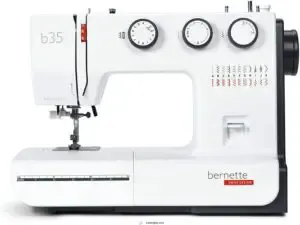
The Bernette 35 Swiss Design Sewing Machine is your trusty mechanical companion in sewing.
It comes equipped with 23 utility and decorative stitches, making everyday projects a breeze.
While it handles quiet operation like a pro, don’t push it on thick fabrics; it’s not built for heavy-duty tasks.
You’ll appreciate the automatic buttonhole feature, even if it leans slightly oversized.
Despite manual threading, the machine is beginner-friendly, requiring straightforward maintenance with all necessary accessories included.
Just be mindful of its quirks!
Best For: The Bernette 35 Swiss Design Sewing Machine is best for beginners and those who sew everyday projects with lighter fabrics.
- Easy to use and quiet operation.
- Comes with all necessary accessories for basic sewing.
- Has an automatic buttonhole feature.
- Not suitable for heavy-duty sewing or thick fabrics.
- Some users report issues with the machine not working properly.
- May have difficulty finding extra feet and accessories online.
2. Singer Heavy Duty Sewing Machine
Upgrade your sewing game with the Singer Heavy Duty Sewing Machine. Its powerful motor plows through heavy fabrics like denim and canvas with ease.
You’ll appreciate the 110 stitch options, perfect for both basic and decorative sewing. The top drop-in bobbin and built-in needle threader save time, while the one-step buttonhole guarantees consistency.
Although heavier than some, its metal frame provides unbeatable durability and stability. Just remember, it might get noisy at high speeds and doesn’t include a quilting extension table!
Best For: This sewing machine is best for those who sew heavy fabrics and need a durable machine with plenty of stitch options.
- A sewing machine with a sturdy metal frame, such as the SINGER Heavy Duty Sewing Machine, provides a solid foundation for sewing various fabrics. Powerful motor for sewing thick fabrics
- Large variety of stitches for different sewing needs
- Durable metal frame for stability
- Can be noisy at high speeds
- Does not include a quilting extension table
- Heavier than some other sewing machines
3. Brother XR3774 Sewing Quilting Machine
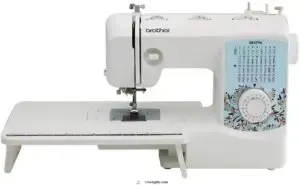
Thirty-seven built-in stitches, including quilting options, make this machine a versatile choice.
You’ll appreciate the automatic needle threader, a lifesaver for beginners.
The drop-in top bobbin is super convenient, and you can read more about its features in a detailed Brother XR3774 review.
It comes with helpful extras like a wide table and
Best For: This machine is best for beginners or those who want a basic machine for quilting projects.
- Easy to learn and use
- Comes with helpful accessories
- Good value for the price
- Can be noisy and vibrate
- Automatic needle threader can be finicky
- May need to be upgraded for more advanced projects
4. Janome MOD 50 Computerized Sewing Machine
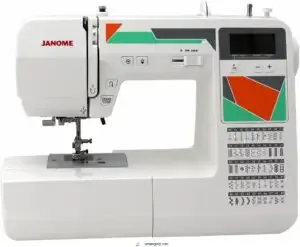
Imagine diving into sewing with the Janome MOD 50 Computerized Sewing Machine—your trusty sidekick on a creative adventure.
It’s jam-packed with features like 50 built-in stitches and an easy one-hand needle threader, making your projects a breeze.
Forget tangled threads with its top-loading bobbin and clear cover, while the eye-friendly LCD helps navigate every stitch.
Though light, its pedal may need some anchoring.
Handle multi-layers with care, and you’re set for stitching success.
Grab it, sew heroes await!
Best For: The Janome MOD 50 Computerized Sewing Machine is best for beginners and intermediate sewers who want a machine with a variety of features and ease of use.
- It has 50 built-in stitches and an easy one-hand needle threader.
- The top-loading bobbin and clear cover make it easy to avoid tangled threads.
- The LCD display is easy to read and navigate.
- The pedal is light and may need additional stabilization.
- The bobbin thread can get tangled near the end of the bobbin.
- You may need a voltage converter if you are using it outside of the US.
5. Mini Sewing Machine for Beginners
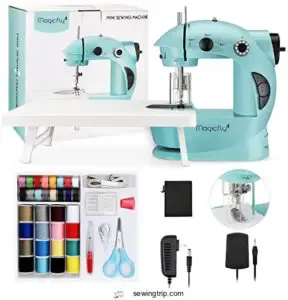
When you’re new to sewing, a mini sewing machine like the Magicfly MF6033 can be your trusty companion.
This compact powerhouse fits neatly into a backpack and runs on batteries for ultimate portability.
Despite its small stature, it offers dual-speed functionality—perfect for easing into sewing projects.
You get practical accessories, including a seam ripper and extension table.
However, it only provides one stitch type, and while it’s great for light tasks, it might struggle with heavy fabrics or complex projects.
Best For: The Magicfly MF6033 is best for beginners who want a portable sewing machine for simple projects and light fabrics.
- Compact and portable for sewing on the go.
- Dual-speed functionality for controlled sewing.
- Includes essential accessories for basic sewing tasks.
- Limited to one stitch type with no reverse function.
- Not suitable for heavy fabrics or large-scale projects.
- Inconsistent performance with potential for jamming and thread breaking.
6. Mini Sewing Machine for Kids
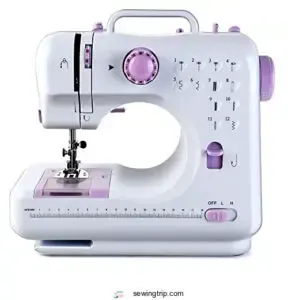
Kickstart your child’s crafting adventure with a mini sewing machine that’s kid-friendly!
Designed for beginners, this compact machine is easy to use and store, making it perfect for small hands and creative minds.
Despite its lightweight design, it tackles light fabrics with ease.
However, be cautious about the needle jamming or the pedal acting up.
If issues arise, customer service might be a bit slow, but they do offer replacements.
It’s an affordable way to introduce sewing, sparking creativity without breaking the bank.
Best For: This mini sewing machine is well-suited for projects like a simple gathered skirt for little girls or an elastic-waist skirt for women, perfect for learning the basics of sewing with simple sewing machine projects for beginners. This mini sewing machine is best for kids and beginner sewers who want to learn the basics of sewing.
- Easy to use and store
- Affordable and lightweight
- Good for light fabrics
- Prone to jamming and needle breakage
- Pedal may be defective
- Customer service may be slow to respond
7. Portable Sewing Machine with 12 Stitches
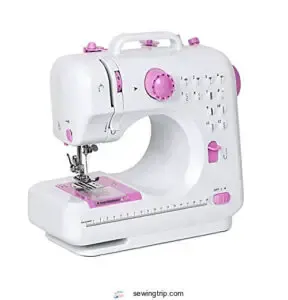
Looking for a portable sewing machine with 12 stitches? You’ve got a friend in the NEX machine! It’s lightweight, making it perfect for those who like to sew on the go.
With features like an LED light, reverse function, and foot pedal, it’s versatile for various projects.
However, watch out for its quirks—like the small foot pedal and threading issues. It’s mostly made of plastic, so handle with care.
Great for beginners, but it requires patience and a bit of troubleshooting.
Best For: This sewing machine is best for beginners looking for a portable and affordable option.
- Lightweight and portable.
- Includes 12 built-in stitch patterns.
- Comes with a foot pedal for speed control.
- Mostly made of plastic.
- Can be difficult to thread.
- May not handle thicker materials well.
8. Juki HZL 70HW Sewing Machine
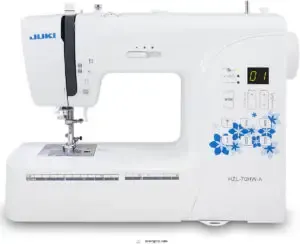
The Juki HZL 70HW Sewing Machine is like a trusty sidekick for your sewing adventures.
With industrial technology, it excels in stitch quality across a range of fabrics, from light to three layers of denim.
It features 180 sewing patterns and eight buttonhole types, perfect for creative projects.
The quick bobbin preparation and LED light make sewing smoother.
However, it’s not heavy-duty, so consider your needs carefully.
Despite some reports of bobbin and tension issues, many find it reliable and user-friendly.
Best For: The Juki HZL 70HW Sewing Machine is best for home sewers who want a machine with industrial-quality stitching and a wide range of features.
- Offers a wide range of sewing patterns and buttonhole options.
- Includes a quick bobbin preparation system and LED light for easy sewing.
- Designed to handle a variety of fabrics, from light to heavy weight.
- Some users reported issues with bobbin winding, tension, and jamming.
- It’s not a heavy-duty machine, so it may not be suitable for all sewing projects.
- Some users found the machine to be frustrating to use.
9. Brother XM2701 Sewing Machine
Budgets can breathe easier with the Brother XM2701—a versatile champion for beginners.
With 27 built-in stitches, from decorative to zigzag, it’s like having a sewing class in a box.
The automatic needle threader saves a heap of time, while the jam-resistant drop-in bobbin cuts the hassle.
Even those secret sewing dreams you have won’t be intimidating, thanks to the included free arm for tricky spots.
Plus, with six sewing feet and a handy instructional DVD, you’re all set for seamless creativity.
Best For: The Brother XM2701 is best for beginners and hobbyists seeking an affordable, user-friendly sewing machine with a good range of features.
- Automatic needle threader makes threading a breeze.
- Jam-resistant drop-in bobbin is easy and convenient to use.
- Comes with a helpful instructional DVD and a variety of accessories.
- The presser foot lever is made of plastic and may be prone to breakage over time.
- The instructional DVD’s narrator’s style may not be appealing to all viewers.
- Some users have expressed concerns about purchasing from Amazon.
Mechanical Vs. Computerized Machines
Choosing your first sewing machine can feel overwhelming, so let’s clarify the main types: mechanical and computerized.
We’ll explore the strengths and weaknesses of each, helping you decide which best fits your needs and budget.
Mechanical Machines for Beginners
Understanding mechanical sewing machines can feel like threading a needle in dim light.
They’re heralded for ease of use, straightforward maintenance, and unmatched durability.
Ideal for beginner sewing machines, these workhorses deliver robust stitch quality.
Perfect if you’re looking for the best sewing machine for beginners that simplifies threading and minimizes fuss.
Computerized Machines for Beginners
You’re exploring sewing machines and might wonder if computerized machines are the way to go.
Well, they certainly make stitching feel like a breeze with their advanced features.
Here are some benefits:
- Stitch Selection: Offers a variety of options.
- User Interface: Easier navigation.
- Learning Curve: Smoother for tech-savvy beginners.
Pros and Cons of Each Type
You’ve explored computerized options; now, weigh mechanical vs. computerized machines.
Mechanical models boast durability and simplicity, perfect if you enjoy tactile control. Check out some of the top mechanical sewing machines for beginners if you want to learn the fundamentals without getting overwhelmed.
Computerized machines, however, offer greater stitch variety and ease of use with a price tag to match.
| Type | Features |
|---|---|
| Mechanical | Durable, tactile control |
| Computerized | More stitches, user-friendly |
Choosing depends on your needs and budget, with no clear-cut answer.
Budget Considerations for New Sewers
When you’re starting out with sewing, balancing your budget with quality is key—nobody wants to blow their entire hobby fund on a machine that can’t handle a hemline.
Consider machines that offer essential features at a lower cost while ensuring you won’t be running back to the store after your first few projects.
Low-Cost Machine Features
Just as you decide on mechanical versus computerized sewing machines, the thought of budget-friendly options might pop up.
For beginners, affordability meets function.
Consider these must-have features:
- Stitch quality: Make sure stitches are consistent and neat.
- Ease of use: Look for intuitive controls.
- Durability: Opt for sturdy builds to withstand wear.
Feeling thrifty yet accomplished is the goal!
Long-Term Investment Strategies
Think of your sewing machine as an investment destined to support adventures in creativity.
Prioritize features like sewing machine upgrades and strong warranty value.
Explore options known for brand reputation to guarantee future projects run smoothly.
A well-chosen beginner sewing machine often offers good resale potential.
Regular sewing machine maintenance ensures longevity, making it one of the best sewing machines for beginners.
Price-Quality Balance Assessment
So, you’re ready to buy, but how do you balance cost and quality? Finding a beginner sewing machine that’s both affordable and reliable is key. Don’t break the bank!
Look for:
- Value for money: Not the cheapest, but not the priciest either.
- Budget sewing machines: Many offer surprising features.
- Affordable quality: Durable construction is important.
- Price vs. performance: Match the machine to your skill level.
- Price-quality trade-offs: Prioritize essential features. A good machine will last.
Essential Sewing Techniques for Beginners
Learning essential sewing techniques is like opening a secret world of creativity, where mastering basic stitches and fabric handling empowers you to tackle any project.
You might mess up a few times, but the joy of untangling those pesky thread knots makes it all worthwhile.
Basic Stitches and Techniques
As you weigh budget options, let’s tackle those first stitches with your sewing machine for beginners.
Master the straight stitch, back stitch, and zig zag to add solid skills to your toolkit.
Buttonholes might sound tricky, but they’re just another stitch type.
These are foundational techniques for seam finishing, essential for any beginner sewing adventure.
Working With Fabric
Choosing the right fabric is the backbone of sewing success.
Whether you’re stitching cotton or denim, understanding fabric types and sewing patterns helps you avoid tangled messes.
To get the best results, it’s also important to think about factors like fabric drape, fiber content, and the benefits of prewashing fabrics for quality.
Always match your thread selection to the fabric for seamless results.
Remember, fabric care is essential; pre-w
Troubleshooting Common Issues
Wrestling with needle jamming or thread breakage? Don’t sweat it; these hiccups happen to everyone.
Adjust your tension settings to banish stitch skipping.
When bobbin winding becomes a chore, make sure it’s snug and evenly wound.
When choosing a sewing machine, consider the variety of stitch types, automatic features, and a built-in needle threader, as outlined in key sewing machine features. Beginner sewing machines aren’t complete without troubleshooting tips.
Check out sewing machine troubleshooting and embrace these fixes for smoother, hassle-free beginner sewing adventures!
Frequently Asked Questions (FAQs)
Which Brother Sewing Machine is best for beginners?
Don’t let the choices overwhelm you!
The Brother CS7000X shines for beginners.
It’s easy to use, boasts tons of stitches, and has an automatic needle threader—a lifesaver!
You’ll master sewing in no time.
Which sewing machine is best for beginners?
For beginners, the Brother CS7000X shines with its user-friendly features, like 70 stitch options and an automatic needle threader.
Its built-in LCD screen and quilting capabilities make it an ideal choice for new sewing enthusiasts.
What is the fastest sewing machine?
Speed stitches swiftly with the Juki TL-2010Q, known for its rapid 1,500 stitches per minute.
It’s ideal for intricate quilting projects, delivering precision and power while keeping your fabric flying through smoothly and efficiently.
Which sewing machine is best for quilting?
Get started with quilting with the Brother CS7000X.
It’s packed with 70 stitches, quilting accessories, and an automatic needle threader.
Its wide sewing table offers ample space, making quilting projects a breeze.
You’ll stitch like a pro!
How do I choose a sewing machine?
Start by considering your sewing needs and budget.
Look for essential features like automatic needle threaders, a variety of stitches, and a durable frame.
Read reviews and make sure the machine feels comfortable and easy to use.
How do I find the best sewing machines?
Unearthing the perfect sewing machine feels like striking gold!
Check reviews, prioritize ease of use, stitch variety, and durability.
Consider your budget and specific needs.
Ask seasoned sewers; their tales often give treasures beyond mere specifications.
What is the easiest sewing machine to learn to use?
Brother CS7000X Sewing and Quilting Machine is a breeze for beginners.
It offers 70 stitches, an automatic needle threader, and a jam-resistant bobbin.
You’ll quickly master basics, thanks to its user-friendly design and clear instructions.
How to pick a beginner sewing machine?
Consider your budget and desired features. Look for a machine with an automatic needle threader and easy-to-understand instructions. Read reviews before buying; you’ll thank yourself later!
How much should a beginner spend on a sewing machine?
Diving into sewing doesn’t break the bank.
Aim for a machine priced between $150 and $
This range offers reliability, ease of use, and essential features without overwhelming your wallet or skills.
Happy stitching adventures await!
Which sewing machine is best for learning?
When learning to sew, you’ll love the Brother CS7000X for its 70 stitch options and user-friendly features.
It has an automatic needle threader and top-loading bobbin, making sewing easy as pie even for beginners.
How do I maintain my sewing machine?
About 80% of sewing machine issues come from lack of maintenance.
Clean your machine regularly by removing lint.
Change needles every project or two.
Oil the machine if needed.
Cover it when not in use.
What size needle should I use?
Needle size depends on your fabric.
For lightweight fabrics, use an 8/60 to 10/70 needle.
Medium fabrics need 12/80 to 14/
Heavy fabrics require 16/100 or larger.
Match the needle to thread and fabric for best results.
Can I sew leather with beginner machines?
When choosing a beginner sewing machine, look for features like automatic threading and a variety of stitches to enhance the learning experience, such as with the SINGER Quantum Stylist 9960 features. You can sew with beginner machines like the Brother ST371HD, but do use a leather needle and walking foot.
Go slow and steady to tackle thicker materials without overwhelming your machine or yourself.
Are beginner machines good for quilting?
Beginner machines can handle basic quilting projects, focusing on more straightforward stitch work.
Models like the Brother CS7000X offer quilting-friendly features, such as a quilting table and various stitch options, making it beginner-friendly yet versatile.
How do I troubleshoot common sewing issues?
Troubleshooting’s easy! Check your threading, needle, and bobbin. Is the tension right? Clean out lint. A quick online search often helps solve those pesky problems. Happy sewing!
Conclusion
Imagine finding the perfect machine among the top-rated sewing machines for beginners reviewed, choosing the right machine. Sewing your dreams into reality with the perfect beginner’s sewing machine.
Finding what’s the best sewing machine for beginners doesn’t have to be overwhelming.
With options like the Brother XM2701’s simplicity or the Janome C30’s tech-savvy features, you can tailor your choice to fit both your budget and skill level.
Start your stitching journey with ease by considering key features like automatic needle threading and durability.
Happy sewing adventures await you!
- https://www.bhg.com/best-sewing-machines-for-beginners-7479688
- https://www.thespruce.com/best-beginner-sewing-machines-to-buy-4137153
- https://www.forbes.com/sites/forbes-personal-shopper/2023/09/07/the-best-sewing-machines-for-beginners/
- https://www.popsci.com/gear/best-sewing-machine-for-beginners/
- https://www.goodhousekeeping.com/appliances/g16/sewing-machine-reviews/

